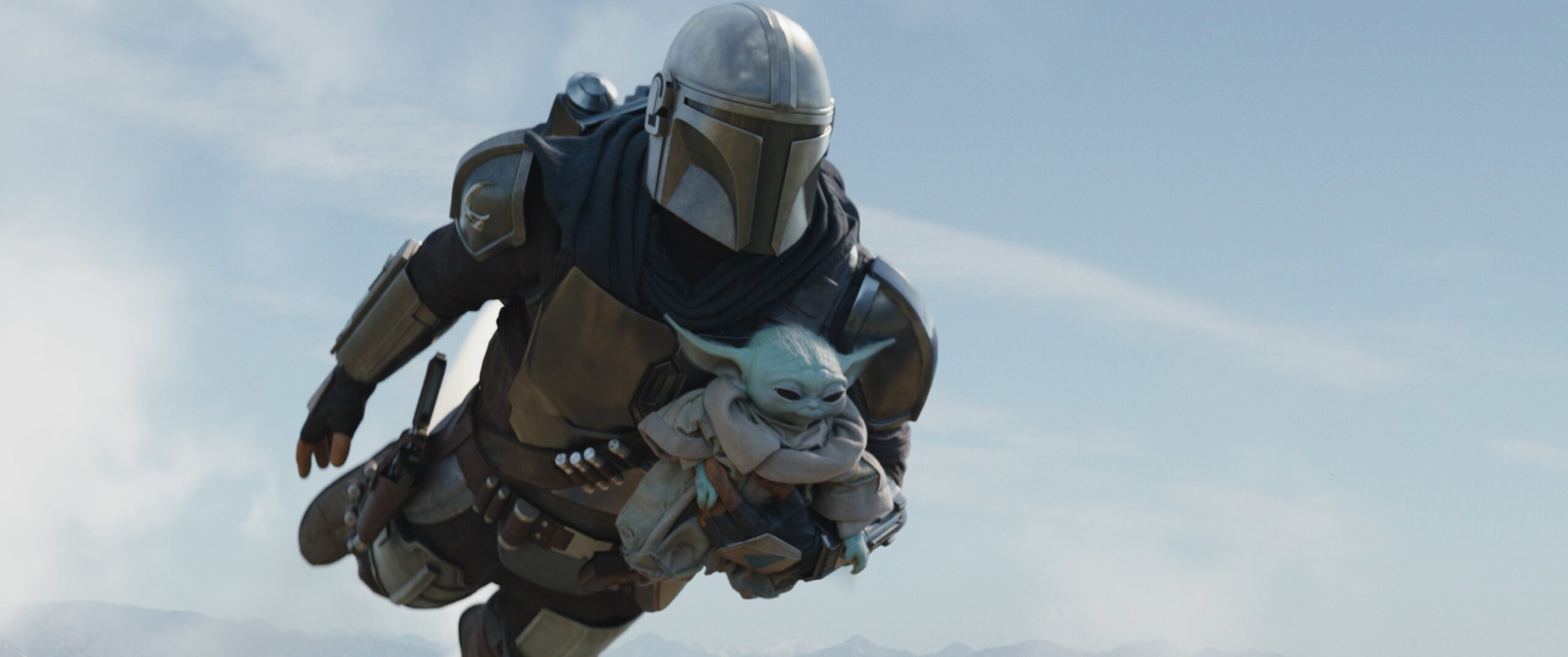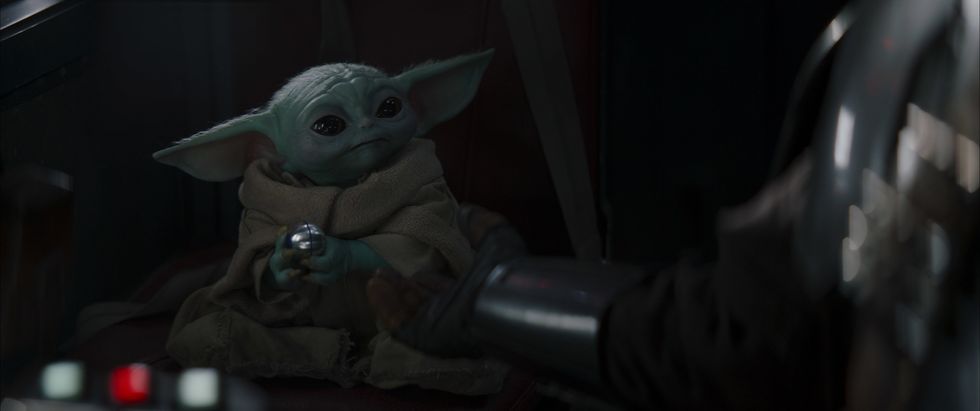
Grogu and the Mandalorian (Pedro Pascal) in Lucasfilm's THE MANDALORIAN, season two, exclusively on Disney+.
© 2020 Lucasfilm Ltd. & ™
In the final scene of Season 2 of The Mandalorian, Mando reassures Grogu (AKA Baby Yoda) that it is okay to leave with his new guardian.
As a former foster care kid, this was an all-too familiar scene. Having had multiple foster homes in the space of a few years, I had to deal with the introduction of new guardians on a regular basis. Forming personal bonds with my carers, ultimately only to have to leave, was a crushing reality I faced repeatedly throughout my childhood.
In the scene, Grogu’s face really says it all (which is pretty impressive for a puppet).
A show featuring two protagonists who spent their childhoods without their birth parents is the type of representation I never expected to see in the mainstream. Watching the final scene made me realize that The Mandalorian‘s audience could learn a lot about foster care from simply watching Grogu and Mando’s actions and interactions. This was a realization I had when I heard my own reactions to the final scene being echoed by others from my community and from professionals in the field.

Dr. Kirsty Capes holds a PhD from Brunel University London in representations of “care experienced” children in contemporary British literature. She says, “I know that I cried at that final scene when Grogu is taken away by Luke Skywalker. I think that the devastation of that scene — despite its hopeful message — is grounded in a sense of having the carpet pulled out from under you. Grogu has learned to trust, love, and respect Mando; and Mando the same for Grogu. To have to begin again with a new guardian feels impossible and heartbreaking.”
Careful Portrayals
The Mandalorian is one of many shows in today’s mainstream that features a main character who has “care experience.”
In the UK, “care experienced” is a term used to describe anyone who grew up experiencing the care system. This could be because they spent time during their childhood in foster care, in a children’s home, or in kinship care (i.e. living with a family or friend who isn’t their birth parents).
Some of the most famous fictional characters are care experienced. Harry Potter, James Bond, Batman, Matilda, Superman — the list goes on. However, care experience isn’t the only similarity these protagonists tend to share.
Often, characters who have been orphaned or separated from their birth parents are portrayed as having exceptional abilities. There’s Harry Potter, the greatest wizard that ever lived; James Bond, the world’s best spy; and Superman — well, it’s in the name.
“There’s always this superhero-esque trope that comes with characters who are care experienced,” explains Lys, 22, a care experienced social work student from England. “I think these portrayals put pressure on care-experienced people, like we have some inhuman ability to withstand adversity. And the truth is, most of us don’t! We’re just people trying to navigate our way through life like everybody else.”
But there’s something different about The Mandalorian. Neither Grogu or Mando particularly adhere to these stereotypes, despite both being shown to have remarkable talents.
It’s refreshing to see a new-breed of care experienced protagonists: characters who, like me, struggle with imperfections and the consequences of their trauma.
Grogu and Mando
In order to remain undetected during the Imperial Era, Grogu had to conceal his force powers when he was a child. The trauma caused by hiding his identity for so long meant that he lost touch with his abilities and is not as powerful as he once was. Like many other care experienced protagonists, Grogu has gone through trauma, and he’s still feeling the effects.
Lys confirms: “It’s nice to be able to identify with the characters as they grapple with their identity, heritage and the internal conflicts that emerge from enduring trauma at a young age. It makes a nice break from having to watch countless films and tv shows with characters we can’t relate to.”
Meanwhile, Mando also clearly still feels the effects of his own childhood trauma. In the third episode of the first season, Mando experiences a turning point when he saves Grogu from the empire. Mando abandons his reputation and creeds in order to rescue a child he’s only just met.
This action is prompted by a flashback to when he himself was saved by a stranger as a child after the apparent death of his birth parents. His heroism, whilst exceptional, is directly informed by his trauma and not by a sense of righteousness or by the usual “superhero” reasoning.
Dr. Capes suggests that “whilst Mando is initially seen as the ‘savior’ to Grogu, they both learn valuable lessons from each other about what it means to be cared for. In the end, Mando needed Grogu as much as Grogu needed him.”
The Expanded Universe
Star Wars is no stranger to care experienced main characters. In the original trilogy, Luke’s character adheres to the aforementioned stereotypes; he’s the savior with a troubled past. Over the course of his story, his attempts to reconcile with his family put him in mortal peril. As Adam — a 24-year-old self-proclaimed huge Star Wars fan and care experienced CEO from Scotland — says, “Luke having to connect with a family he doesn’t know, literally almost kills him.”
However, the films make it seem like he’s hardly emotionally affected by this. Whilst Luke does experience traumatic events during the trilogy — most notably finding out that Darth Vader is his father — his emotions and feelings around these events are not explored or reflected in his character going forward.
Similarly, in the Star Wars sequel trilogy, Rey’s character adheres to the “savior” plotline. As well as being the hero of the story, her character is defined by the mystery behind her lineage.
As Adam explains, “Rey’s family portrayal only really feels like a story point to make us sympathetic to her character. It doesn’t really drive forward the plot as it’s half-baked, made to be unimportant and then re-important.”
For both Luke and Rey, Star Wars leans on the trope of mystery and the unknown — which leads to “othering,” a phenomenon often seen with characters who don’t know their parents or origins.
However, Dr. Capes points out that this isn’t the case in The Mandalorian. “What’s interesting for me is that Mando is not particularly interested in finding Grogu’s parents — he is more interested in returning him to his ‘own kind’ — though it’s not initially clear whether Grogu’s own kind is his own species, or the Jedi,” she says. “I found the portrayal of both Mando and Grogu’s care experience reasonably refreshing. These are complex, fully formed care experienced characters.”
The Man-DAD-lorian
One of the most important things in The Mandalorian is that in the process of looking after Grogu and trying to raise him, Mando comes to terms with the way he was raised during his time in “care.” He was brought up by the very strict code his Mandalorian “foster parents” instilled in him, and he understood that he would be abandoned if he didn’t follow these rules.
By the end of the series, he’s willing to break the rules and even shows his face — the ultimate dishonor — all in the name of saving Grogu.
Lys says: “What makes The Mandolarian so wonderful is to see that distant, duty-bound responsibility turn into a caring and unconditional relationship between Mando and Grogu, in which he becomes ‘Mando’s child.'”
Adam adds: “Although the show may center around two care experienced characters, I think the actual plot is about a father finding a son, which is the nice part.”
The ultimate lesson of The Mandalorian is that families can be born out of anything. From the very first Star Wars trilogy, its universe maintains that family and blood lines are what dictate your importance and your ability to succeed.
Finally, with The Mandalorian, we have a Star Wars story that portrays family as something that can be chosen, made up of those that care for you and not just the blood running through your veins.
For any Star Wars writers reading: This is the Way.
Thanks to Lys, Adam and Dr Kirsty Capes for sharing their perspectives.
Dr Capes’ debut novel Careless, about a care-experienced teenager, will be published by Orion Books in May 2021.














